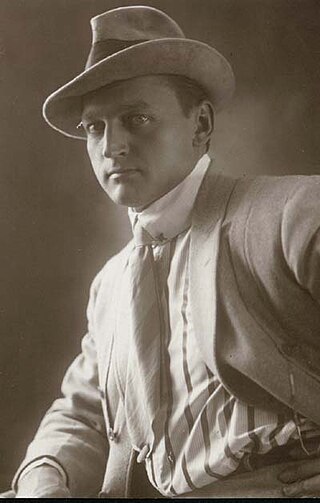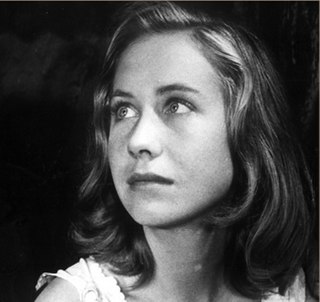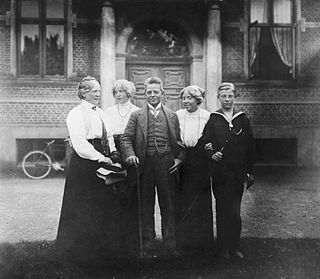Related Research Articles

Carl August Nielsen was a Danish composer, conductor and violinist, widely recognized as his country's most prominent composer.
Incidental music is music in a play, television program, radio program, video game, or some other presentation form that is not primarily musical. The term is less frequently applied to film music, with such music being referred to instead as the film score or soundtrack.

The earliest traces of Danish music go back to the many twisting Bronze-Age horns or lurs which some experts have identified as musical instruments. They have been discovered in various parts of Scandinavia, mostly Denmark, since the end of the 18th century. Denmark's most famous classical composer is Carl Nielsen, especially remembered for his six symphonies, while the Royal Danish Ballet specializes in the work of Danish choreographer August Bournonville. Danes have distinguished themselves as jazz musicians, and the Copenhagen Jazz Festival has acquired an international reputation. The modern pop and rock scene has produced a few names of note, including MØ, Dizzy Mizz Lizzy, Lukas Graham, D-A-D, Tina Dico, Aqua, The Raveonettes, Michael Learns to Rock, Volbeat, Alphabeat, Safri Duo, Medina, Oh Land, Kashmir, King Diamond, Outlandish, and Mew. Lars Ulrich is the first Danish musician to be inducted into the Rock and Roll Hall of Fame.
Kenny Clayton was a British record producer, arranger, conductor and jazz pianist.

Anne Kristine Linnet is a Danish singer, musician and songwriter. She has released a number of solo albums and has also been a member of the bands Tears, Shit & Chanel, Anne Linnet Band, Marquis de Sade and Bitch Boys. Anne Linnet is one of a small group of Danish songstresses who have been popular for multiple decades. She is, and has been for five decades, a distinctive figure on the Danish music scene and is known for her honest musical phrasings, memorable and sometimes feministic lyrics, and renewal through explorations into a number of music styles.

Kirsten & Søren, known internationally as Hot Eyes, were a Danish singing duo consisting of Kirsten Siggaard Andersen and Søren Bundgaard Nielsen.

Peter Malberg was a Danish actor best known for his role as Onkel Anders in the Far Til Fire movies. Peter was originally educated as a painter, but his job at Århus Theatre as a scenic painter along with the fact that his older brother Henrik was an actor, eventually led to him being in theater- and later filmindustry.

Johannes Meyer, was a Danish film actor.

Johan Peter Emilius Hartmann was, together with his son-in-law Niels W. Gade, the leading Danish composer of the 19th century, a period known as the Danish Golden Age. According to Alfred Einstein, he was "the real founder of the Romantic movement in Denmark and even in all Scandinavia". J.P.E. Hartmann was the third generation of composers in the Danish musical Hartmann family.
Alice O'Fredericks was a Danish actress, screenwriter, and film director. She is best known for directing the series of Far til Fire comedies and the series of family dramas based on Morten Korch novels. Having written 38 produced screenplays and directed 72 feature films, O'Fredericks was one of the most prolific directors in Danish cinema. O'Fredericks also directed the first Danish films which highlighted women's rights. The Alice Award, presented annually to the Best Female Director at the Copenhagen International Film Festival, is named in her honor.

Tove Maës was a Danish actress of stage, television and film best known for her starring roles in the series of "Morten Korch" films, in particular The Red Horses. Maës was a three-time recipient of the Bodil Award for Best Actress, winning in 1954, 1971, and 1983.

Helle Genie Virkner née Lotinga was a Danish actress, author and spouse of Prime Minister Jens Otto Krag

Carl Nielsen's Aladdin, Opus 34/FS 89, is incidental music written to accompany a new production of Adam Oehlenschläger’s "dramatic fairy tale" presented at The Royal Theatre in Copenhagen in February 1919.

Carl Nielsen's Wind Quintet, or as indicated by the original score, the Kvintet for Flöte, Obo, Klarinet, Horn og Fagot, Op. 43, was composed early in 1922 in Gothenburg, Sweden, where it was first performed privately at the home of Herman and Lisa Mannheimer on 30 April 1922. The first public performance was on 9 October 1922 in the smaller hall at the Odd Fellows Mansion in Copenhagen. It is considered a staple of the repertoire for wind quintet.

Carl Nielsen's String Quartet No. 4 in F major or Quartet for Two Violins, Viola and Cello in F major, Opus 44, was composed between February and July 1906. The last of Nielsen's four string quartets in the official series, its first public performance took place on 30 November 1907 in Copenhagen.
Carl Nielsen's rhapsody overture An Imaginary Trip to the Faroe Islands, is a musical composition for orchestra. The Royal Danish Theatre in Copenhagen commissioned the piece for a gala concert celebrating a visit from the Faroe Islands. The composer conducted the premiere on 27 November 1927.

Carl Nielsen's Saga-Drøm, also known as Gunnar's Dream, is a tone poem for orchestra based on the Icelandic Njal's Saga. It was first performed at the Music Society (Musikforeningen) in Copenhagen on April 6, 1908 by Nielsen himself.
Fynsk Foraar, for soloists, chorus and orchestra, Opus 42, is Carl Nielsen's last major choral work. Written to accompany a prizewinning text by Aage Berntsen, it was first performed in Odense's Kvæghal on 8 July 1922 where it was conducted by Georg Høeberg.
References
- 1 2 3 4 "Preface: The Mother, a Play in a Prologue and Seven Scenes", Carl Nielsen Edition Archived 2010-04-09 at the Wayback Machine , Royal Danish Library. Retrieved 26 October 2010.
- 1 2 Margaret Godfrey, "Moderen, incidental music, FS 94 (Op. 41)", Allmusic.com. Retrieved 12 November 2010.